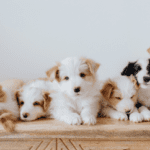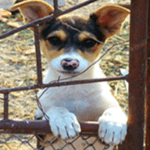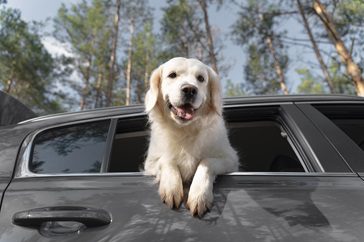 One of the most exciting things you will encounter in life is bringing home a new puppy. However, a lack of planning can turn a wonderful experience into a nightmare. It can be stressful to raise a puppy when you don’t have the right training, supplies, or patience.
One of the most exciting things you will encounter in life is bringing home a new puppy. However, a lack of planning can turn a wonderful experience into a nightmare. It can be stressful to raise a puppy when you don’t have the right training, supplies, or patience.
This page was designed to help you plan for your new puppy so you will be ready for the unexpected. Trust me, when it comes to puppies, there will always be something unexpected.
Raising a puppy will take everything you’ve got but if you do it right, you will make memories that last a lifetime.
Table of Contents
Before You Get a New Puppy
Choose a Breed
Before you even choose your new puppy, you will need to make a few preparations. The first thing you need to do is decide on what type of puppy to get. This is important as you need to get the right breed of dog for your situation. Deciding on a breed early in the process will give you time to visit shelters or breeders to see what they have available.
There are many things to consider when picking out a puppy. Do you need a dog that won’t trigger allergies? Or maybe you need a breed that’s good with kids? Whatever your situation, it is worth the effort to do your research and choose the right breed.
Puppy-Proof Your Home
Before you bring home your puppy, you will have to make sure your home is safe for him or her to explore. Puppy-proof your home and buy all the necessary supplies ahead of time. Be aware though that these supplies can add up quickly. Start with the basic must-have puppy supplies and add more as your budget allows.
Pick a Name
It might be a good idea to pick out a few puppy names before bringing the little one home. Once you choose a name, you should try to stick to it since you don’t want to confuse the puppy by changing his name after a week or two.
Getting the Puppy Home
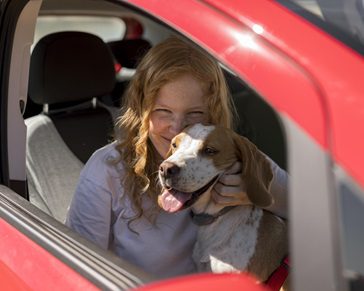 Once you have chosen your puppy, puppy-proofed your home and purchased all the necessary supplies, it’s time to bring your new puppy home. If you are bringing the new puppy home in a car, then you should be prepared. Puppies can get car-sick so make sure to have some old towels, wet wipes, a bottle of water, and a non-toxic car air freshener just in case you need to clean up smelly vomit.
Once you have chosen your puppy, puppy-proofed your home and purchased all the necessary supplies, it’s time to bring your new puppy home. If you are bringing the new puppy home in a car, then you should be prepared. Puppies can get car-sick so make sure to have some old towels, wet wipes, a bottle of water, and a non-toxic car air freshener just in case you need to clean up smelly vomit.
While you may be tempted to let your puppy sit on your lap in the car (never, ever do this while in the driver’s seat), the safest way to transport your puppy is in a crate. Make sure it is small enough to keep your puppy feeling cozy and safe, yet big enough for them to turn around.
On the way home, do not stop at a pet store, dog park, or any public place where other dogs have been. Your puppy probably hasn’t had his puppy vaccinations yet and could pick up a life-threatening illness.
Bringing Home a New Puppy: What to Expect
 The big day is finally here, and you get to bring home your little bundle of joy. Everyone is excited and can’t wait to get him home to play with him and give him plenty of love and attention. However, you need to remember that a puppy is just like a human baby and will need lots of sleep and potty breaks (be glad that you don’t have to change diapers). There are other things he needs too and many things you probably haven’t thought of yet. If you’ve done your research beforehand, you should be prepared to easily meet your puppy’s needs.
The big day is finally here, and you get to bring home your little bundle of joy. Everyone is excited and can’t wait to get him home to play with him and give him plenty of love and attention. However, you need to remember that a puppy is just like a human baby and will need lots of sleep and potty breaks (be glad that you don’t have to change diapers). There are other things he needs too and many things you probably haven’t thought of yet. If you’ve done your research beforehand, you should be prepared to easily meet your puppy’s needs.
Potty Time and Exploration
When bringing home a new puppy, don’t bring him into the house right away. Take the puppy to its ‘potty spot’ in the yard and let him go potty. This way, he will know where he is supposed to go right away which will help with potty training.
After you take him inside, place him in a gated room or a play-pen and allow him to explore. Make sure to watch him at all times. Even though you have probably puppy-proofed the house, a curious puppy will always find something to get into that he shouldn’t. Also, keep him in a confined area to start with. Giving him full access to your home will make housebreaking difficult and your puppy could get lost or scared.
Nap Time and Crate Training
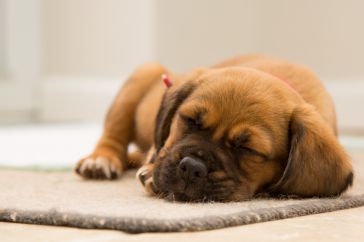 After a while, your little guy is going to get tired and will need to take a nap. You should start crate training right away. Keep the crate in your puppy’s confined area so he can go inside and sleep when it gets tired. Start by keeping the door open and throwing treats inside for the puppy to find. When the puppy goes inside, close the door for a few seconds and then open it. Make it like a game for the puppy so it will want to go in the crate. Keep the door closed longer and longer each time.
After a while, your little guy is going to get tired and will need to take a nap. You should start crate training right away. Keep the crate in your puppy’s confined area so he can go inside and sleep when it gets tired. Start by keeping the door open and throwing treats inside for the puppy to find. When the puppy goes inside, close the door for a few seconds and then open it. Make it like a game for the puppy so it will want to go in the crate. Keep the door closed longer and longer each time.
The first night in the crate will be hard. I suggest moving the crate to your bedroom but be sure to ignore any crying and whining from the puppy while he is in there. If the puppy wakes up in the middle of the night and starts crying, he needs to go potty. Take the puppy outside to go potty and put it right back in the crate when you come inside. If he continues to whine, just ignore it. After a few nights, your puppy will learn to sleep through the night without making a peep.
Meeting the Family
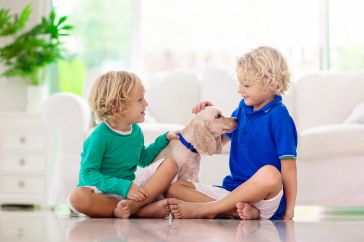 I’m sure your entire family is excited about getting to meet the new puppy. Children need to be calm and relaxed around the puppy. If your children start to get too excited, have them leave the room and calm down. An overstimulated child can cause your puppy to get worked up as well.
I’m sure your entire family is excited about getting to meet the new puppy. Children need to be calm and relaxed around the puppy. If your children start to get too excited, have them leave the room and calm down. An overstimulated child can cause your puppy to get worked up as well.
Allow your other animals time to get used to the new puppy. Cats will be curious but will generally stay a safe distance away until they are ready to meet the puppy. Be sure to supervise the puppy around other animals. A large puppy could easily kill a cat, especially if it thinks the cat is a toy. Other dogs may get jealous of the new puppy and you should be prepared to break up some fights. Once the puppy grows up and the two dogs get used to each other, the fighting, growling, and jealousy should stop.
Play-Time
Keep play-time to a minimum for the first few days. The puppy needs time to get used to his or her new surroundings. After a few days of relaxing in the crate, the pup can begin to play with a bit more energy.
Puppy Exam at the Vet
Within 24 hours of getting your puppy, you need to take him to the vet for a new puppy exam. Most breeders require this plus you must make sure your puppy is in good health and there are no underlying health problems. If your puppy gets sick or if an emergency occurs, it is good to already be familiar with the vet.
What’s Appropriate Behavior For A New Puppy?
If you’ve never raised a puppy before, your puppy’s behavior might be a little confusing. What exactly is normal puppy behavior and what should you be concerned about? Here are a few of the things you might see your puppy do:
Biting & Nipping
It is perfectly normal for a puppy to bite, nip, or mouth your hands, toes, or clothing. However, just because it’s normal, doesn’t mean it’s right. It’s best to train your puppy bite control right away so it doesn’t become a problem when they get older.
Personality Changes
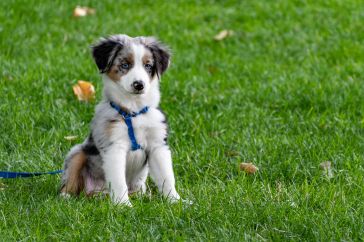 During the first few days of having your puppy home, you may notice a few personality changes. A rambunctious and outgoing puppy may suddenly become shy and withdrawn. They may not want to play and would rather sleep all the time. This behavior change is normal and can be expected.
During the first few days of having your puppy home, you may notice a few personality changes. A rambunctious and outgoing puppy may suddenly become shy and withdrawn. They may not want to play and would rather sleep all the time. This behavior change is normal and can be expected.
Your puppy has just been taken from the only place he knew and felt comfortable in and brought into a completely new environment. He no longer has his siblings and is probably a little lonely, scared, and homesick. If your puppy is extra tired and doesn’t feel like eating, he is probably just missing his old family. After a few days, your puppy will get used to his new home and you’ll start to see him come out of his shell.
Anxiety
Another behavior you may see your puppy exhibit is anxiety. Your new pup will probably be nervous and, if he has a high-strung personality, he may get upset easily. If your puppy doesn’t pee or poop for several hours, don’t be alarmed. He or she may be too stressed out to have a bowel movement. Just be sure to keep a close eye on the puppy so he doesn’t sneak away to pee under your bed or behind the sofa.
Fortunately, there are plenty of things for you to do to help your new puppy feel comfortable and happy in their new home.
 You may notice that when you leave your puppy, even for a second, he starts whining and crying. This means that he is missing the safety and comfort of his mom and siblings. He feels safe with you and wants to be next to you at all times. While you may be flattered to have so much of your puppy’s attention, don’t let the pup get too attached. Otherwise, you will end up with a clingy dog with separation anxiety.
You may notice that when you leave your puppy, even for a second, he starts whining and crying. This means that he is missing the safety and comfort of his mom and siblings. He feels safe with you and wants to be next to you at all times. While you may be flattered to have so much of your puppy’s attention, don’t let the pup get too attached. Otherwise, you will end up with a clingy dog with separation anxiety.
Break your puppy of this habit by leaving him alone for short periods and showing him that you will always come back. For most dogs, crying and whining for the first few minutes after you leave is normal, however, if they freak out, start clawing at the door, and/or lose control of their bladder, then they may have puppy separation anxiety. This is a serious problem that needs to be addressed immediately.
Illness & Disease
Since your new puppy probably doesn’t have his vaccinations yet, he is prone to catching some life-threatening diseases such as Parvo or Distemper. If your puppy isn’t diagnosed early, the chances of survival are low. However, many of the symptoms of these diseases are similar to the symptoms of homesickness. Here are the three signs of illness you should be concerned about:
Severe diarrhea – Your new puppy may experience diarrhea due to anxiety and a change in their diet, however, if your puppy has repeated and constant diarrhea, it may be a sign of a worse problem.
Vomiting – Vomiting is common among puppies. Especially if they play too hard right after they eat or they play too hard on an empty stomach. Puppies also eat things they shouldn’t and may hack them up. If your new pup is vomiting repeatedly, get him to the vet ASAP.
Lethargy – Puppies sleep a lot. Some will sleep as much as 12-18 hours a day. This makes it difficult to tell if the puppy is truly sick or just getting his beauty sleep. A puppy that is sick will have dull eyes and won’t eat. They won’t want to play at all and will look worn out all the time.
If you can’t tell if your puppy is sick, it is always best to err on the side of caution and take your puppy to a veterinarian.
Chewing
 All puppies will chew and they will chew on everything in reach of their mouths. Keep your puppy away from your furniture if you don’t want it to be chewed on.
All puppies will chew and they will chew on everything in reach of their mouths. Keep your puppy away from your furniture if you don’t want it to be chewed on.
Your puppy needs to chew to fill a basic canine instinct so be sure to give the little one plenty of chew toys. When you catch him chewing on something he shouldn’t, be sure to direct him to one of his toys.
Your puppy will usually stop chewing after the peak teething phase so just keep giving him his chew toys until this phase has passed.
Why is my puppy breathing funny?
First Week with Your New Puppy
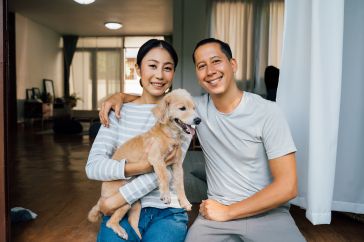 After the excitement of bringing home a new puppy wears off, the reality of raising him can be overwhelming. After all, you are responsible for the survival and upbringing of this little ball of fur. The puppy will look to you for everything.
After the excitement of bringing home a new puppy wears off, the reality of raising him can be overwhelming. After all, you are responsible for the survival and upbringing of this little ball of fur. The puppy will look to you for everything.
During the day, your puppy will need a potty break every 30 minutes when awake and, depending on the size of the puppy, two or three times during the night.
During playtime, the puppy needs to be supervised to make sure he’s not getting into trouble. When the pup is in his crate, he can’t be left alone for too long.
Keep Your New Puppy Home
The puppy should stay home for the first week since he doesn’t have his vaccinations yet. After you receive clearance from the vet that it is safe to take your puppy out and about, you need to provide plenty of chances for your puppy to socialize and learn basic manners and commands. You should also sign him up for puppy kindergarten and beginner obedience classes.
Your puppy’s growth and development will be quicker than that of a human, however, you will still need to deal with the same stages of growth and behavior such as baby, toddler, and adolescent puppy behavior before your puppy becomes an adult dog.
Buyers’ Remorse a.k.a. Puppy Depression
If you are feeling a little depressed or sad about your new puppy and wish you never got him, you may be experiencing puppy depression (also known as puppy blues). Not all puppy owners will experience this but many of you will.
Raising a new puppy and being responsible for its care can be overwhelming. If you are experiencing buyers’ remorse, then check out this page to figure out why and how to deal with it…Puppy Depression (page coming soon).
Our website is designed to help you with all aspects of raising your puppy. We have a ton of tips, tricks, and helpful advice so you can raise your puppy to be a healthy well-behaved adult dog. Click here to follow Hounds 101 on Facebook.

